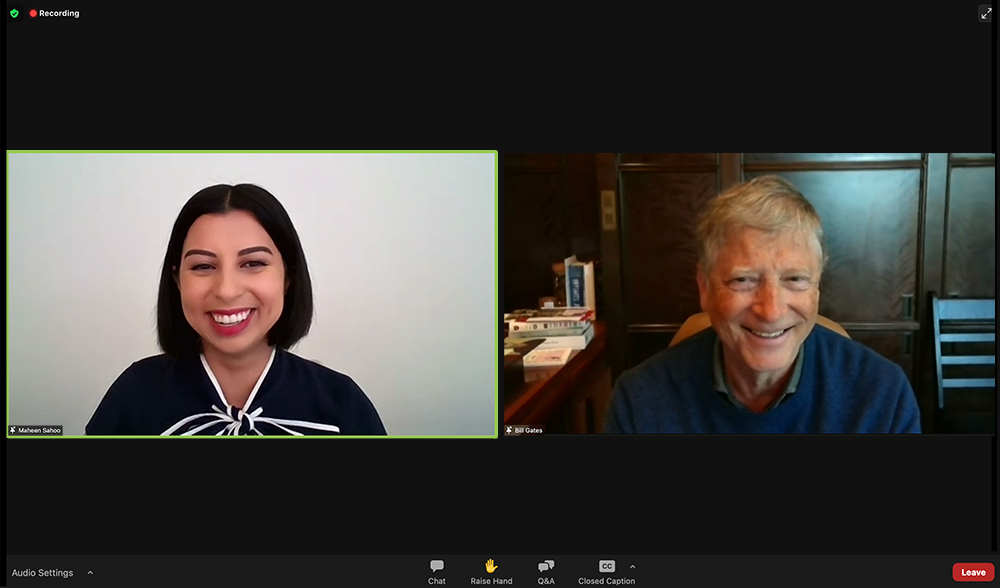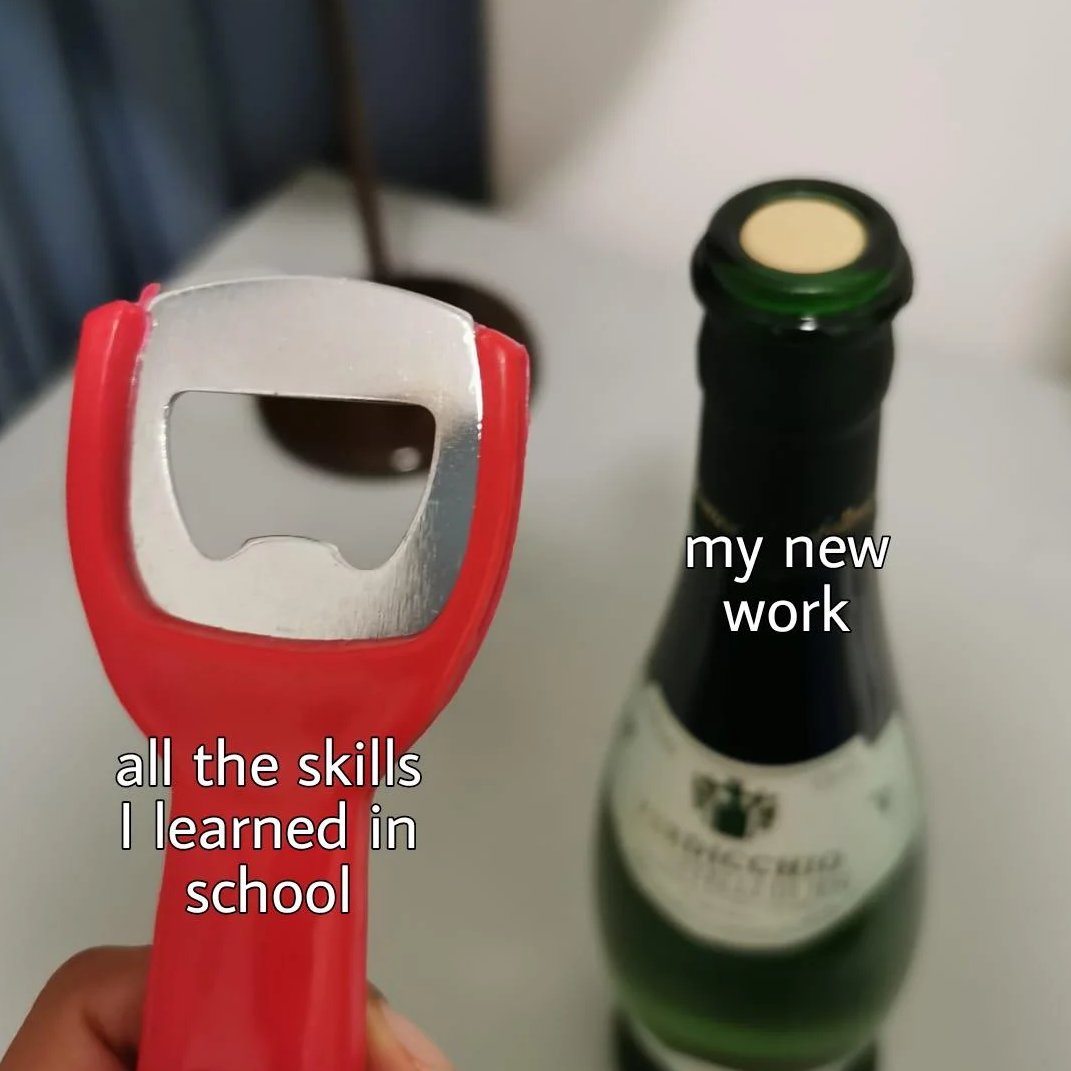“Science was born when, with the progress of technology, the experimental method eventually overcame the social prejudice against manual labor and was adopted by rationally trained scholars” Edgar Zilsel, “The Sociological Roots of Science” (1942) jstor.org/stable/2769053

“Science was born when, with the progress of technology, the experimental method eventually overcame the social prejudice against manual labor and was adopted by rationally trained scholars”

These young leaders make me optimistic that brighter days are ahead for America’s students and teachers. gatesnot.es/3zf8lFM
I enjoyed joining educators from around the world at the @OERProject Conference for the Social Studies to discuss how their teaching practices have changed over the last year and a half. I’m inspired by their resilience and dedication to their students: b-gat.es/3rTM798 pic.twitter.com/f5K54U0OZj

Today’s students have the power to create a better future for all people, and teachers are helping them build their framework for understanding the world. Thank you to Bryan Stevenson for joining the @OERProject Conference for Social Studies this week. gatesnot.es/3rZ70zF
I recently sat down with the extraordinary Brooke Brown, Washington State’s 2021 Teacher of the Year. It was a pleasure to meet with her and take part in one of her favorite lessons: gatesnot.es/2YcTT3g pic.twitter.com/rlB1iJjogC
None of us would be where we are today without the incredible teachers who helped shape our perspectives. Brooke Brown is an extraordinary teacher who has helped her students adapt to extraordinary times. gatesnot.es/2V6nXw9
“How do we use technology and innovation to solve today’s problems?” That’s the question David Sengeh, Sierra Leone’s chief innovation officer and education minister, is looking to answer with the country’s National Innovation and Digital Strategy: gatesnot.es/2VrKjbB pic.twitter.com/EV9zh7Lq0x
School requires you to learn about things after the answer has already been decided. Life requires you to learn about things while the answer is in the process of being decided.
All scientific articles should be free and accessible to everyone.
Education is about more than memorization. Learning & practicing general principles of problem solving is more important than memorizing the techniques of how to solve specific problems. pic.twitter.com/UsHsef7fjf

When educational “success” is associated more with the ability to ask the right questions, and less with the ability to rote learn… India will produce leaders. And the right leaders will bring India the glory that it rightfully deserves. Do not celebrate rote learning.
Education never gets over in the modern world’s context. Technology is advancing, new professions are sprouting up and creativity is the most in-demand skill. Be a fierce learner for the rest of your life. Podcasts, documentaries, non-fiction books - Your new syllabus.
Higher Ed Why has cost been rising? Gov't. If tuition is over a certain amount, you get more gov't funding. Thus it incentivizes unis to charge more One reason professors cost more is that their opportunity cost is higher bc they could get paid more to go into other industries
When you think about the university of the future, what comes to mind? Or asked differently, if you could wave a wand and change anything about universities for the next 10 years, what would you change?
An irony of the “college teaches you how to think” meme is that in some ways college teaches you *not* to think— Don’t think about the lack of viewpoint diversity among profs, don’t think about why costs keep rising, don’t think abt why you enrolled w/o considering alternatives.
Why can’t 100K or 1M students a year attend Harvard? It's partly true that credential quality is tied to its exclusivity or its size— But it's also true that credential quality is tied to the magnitude of its biggest outcomes Keeping same quality bar, Harvard should 10-100x.
Focus too much on utility (get too big), and you kill the signal. Focus too much on signal itself without bolting on utility, then it becomes like Harvard — people know it has no purpose other than the signal and that itself weakens the signal. It becomes a bubble.
Maybe colleges are "just a nonstop party. To be fair, under this scenario they’re a pretty good deal—on a $ per night of partying basis, they beat Bonnaroo, 1 OAK,& other venues that sell the opportunity to get intoxicated while surrounded by attractive young people”-@ByrneHobart
Through Naval, I discovered the term "Curation Businesses" which describe things like Universities, Accelerators, and VC firms twitter.com/naval/status/9…

If Stanford prepares you for citizenship for society, On Deck prepares you to be a citizen of the internet. Any digitally native learning institution should be built in public. Help us build it! As soon as we get 100 signups for any of our categories, we'll release a curriculum

Stanford, Harvard etc peter out at <7K students In a virtual world, why couldn't they accept more? Partly b/c, like nightclubs, status is measured not by how many ppl get in, but by how many don't On Deck's goal is to accept 100K across fellowships—keep quality & expand access
Institutions ceased to be places for the *formation* of individuals Instead they become platforms for *performance* where individuals are allowed to be their authentic selves precisely because they are able to give expression to who they are on the inside amazon.com/Rise-Triumph-M…
On Higher Education: Colleges are charging too much, acting like a monopoly, and aren’t setting students up for success in the job market. In the last half century, costs have tripled, 40% of students drop out; and 3% of GDP is spent on colleges. eriktorenberg.substack.com/p/the-higher-e…
I'm surprised more ppl w/ means don't get expert tutors to help them get up to speed on certain topics An expert has distilled many books & applied their own filter to it—you can get up to speed faster than just reading on your own Who here uses a tutor&where do you find them?
Since 1520, only about 85 institutions have remained continuously in existence. Around 70 are universities – few things last longer or are more resilient than universities. H/t @ani_pai
Some people cynically compare universities to hedge funds but here's the thing—hedge funds are at least accountable to their investors.
UNDEREMPLOYED - 60 out of 100 college students graduate in 6 years. - 40 of 100 drop out. - Only 36 out of 100 college students get jobs worthy of a degree (the rest drop out or work at Starbucks etc). - Consider the opportunity cost of 4-5 yrs of work experience + 0 debt.
ADMINISTRATIVE BLOAT: - Went from 1:2 admin to faculty to 2:1. - Yale spending ~$60K per student on administration - Part of it is b/c higher regulation, so need ppl who can manage regulation. - Weird incentive to lobby for more regulation to justify increased admin budgets.
Some of the big challenges in higher ed👇 - Price is too high & rising - Too much student debt - Too many students dropping out - Too many students underemployed - Credential inflation - Misaligned incentives on multiple levels - Oligopolistic market dynamics prevent competition
UNDEREMPLOYED - Only 50% of employed college graduates got jobs requiring a college degree & only 37% take jobs requiring just a high school diploma. - Over 100,000 w/ bachelor's degrees became janitors. Over 5,000 people w/ master's degrees became janitors.




